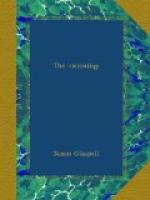The Bishop had wanted his son for the church; but Fred not taking amicably to the cloth, he had urged the navy. Fred had settled that by failing to pass the examinations for Annapolis. Failing purposely, his father stormily held; a theory supported by the good work he did subsequently at Yale. There he became interested in forestry, again to the disapproval of his parents, who looked upon forestry as an upstart institution, not hallowed by the mellowing traditions of church or navy. Now they would hold that Helen proved it.
And Helen did prove something. Certain it was that from neither church nor navy would Fred have seen his Helen in just this way.
Perhaps it was that democracy Wayne had been talking about. Perhaps this democracy was a thing not contented with any one section of a man’s life. Perhaps once it had him—it had its way with him. Katie thought of the last thirty days—of paths leading out from other paths. Once one started—
Fred’s father had never started. Bishop Wayneworth was only democratic when delivering addresses on the signers of the Declaration of Independence. The democracy of the past was sanctified; the democracy of the present, pernicious and uncouth. Thought of her uncle put Katie on the outside, eyes dancing with the fun of the attack.
“Who are her people, Fred?”
“Oh, Western people—ranchers; best sort of people. They raised the best crop of potatoes in the valley this year.”
Katie yearned to commend the family of her daughter-in-law to her Aunt Elizabeth with the boast that they raised the best crop of potatoes in the valley!
“They had hard sledding for a long time; but they’re making a go of it now. They’ve worked—let me tell you. Helen wouldn’t have to work now—but don’t you say that to Helen! What do you think, Katie? She even wants to keep on working after we’re married!”
That planted Katie firmly within. “Oh, she can’t do that, Fred.”
“Well, I wish you’d tell her she can’t. That’s where we are now. We stick on that point. I try to assert my manly authority, but manly authority doesn’t faze Helen much. She has some kind of theory about the economic independence of woman. You know anything about it, Katie?”
“You forget that I’m one of the doll-baby girls,” she replied in a light voice which trailed a little bitterness on behind.
“Not you! Just before I left I said to Helen: ’Well there’s at least one relative of mine who will have sense enough to appreciate you, and that’s my corking cousin Katie Jones!’”
That lured feminine Kate outside again. “Fred,” she asked, moved by her never slumbering impulse to find out about things, “just what is it you care for in Helen? Is she pretty? Funny? Sympathetic? Clever? What?”
She watched his face as he tried to frame it. And watching, she decided that whatever kind of girl Helen was, she was a girl to be envied. Yes, and to be admired.




